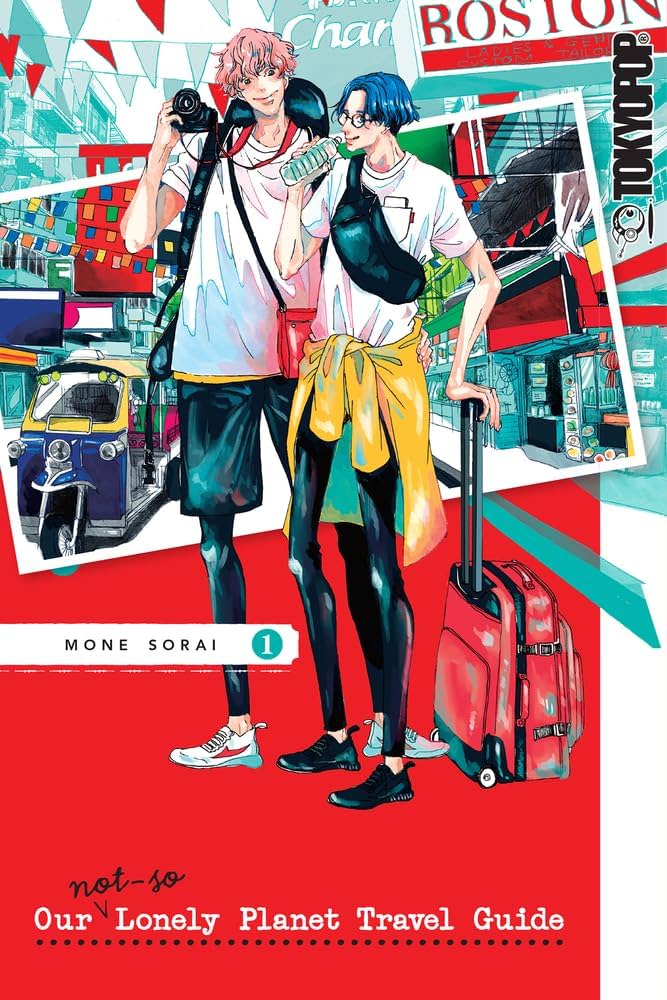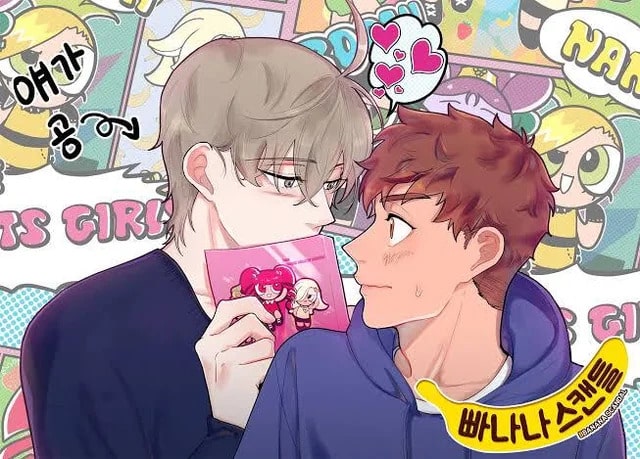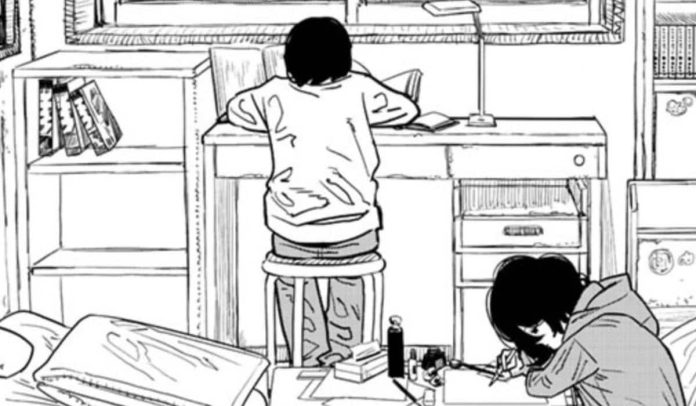There are two universal truths in today’s rapidly changing comics industry. The first is that Dog Man is the defining comic of our era. The second is that more people are reading manga and Webtoons (aka vertical scroll comics) than ever before. Therefore we at The Beat have chosen to embark on a new venture: Beat’s Bizarre Adventure. Every week, we’ll have three writers recommend some of their favorite books and series from Japan, Korea, and elsewhere. This week we have world travel, an early comic by the genius Satoshi Kon, and, of course, BL. Happy start of Pride Month, folks!

Our Not-So-Lonely Planet Travel Guide
Writer/Artist: Mone Sorai
Editor: Lena Atanassova
Translator: Katie Kimura
Copy Editor: M. Cara Carper
Retouching and Lettering: Vibrraant Publishing Studio
Publisher: TOKYOPOP
Asahi and Mitsuki are your textbook “opposites attract” couple. Asahi is a thin, moody, glass-half-empty person who cares too much about how others see him. Mitsuki, on the other hand, is energetic and outgoing with a smile that shines brighter than the sun. They met in high school and started going out following their reunion years later. Our Not-So-Lonely Planet Travel Guide follows in the footsteps of Asahi and Mitsuki as they make the decision to travel around the world and to get married if they are still together when they return to Japan.
Traveling is a great way to generate sparks between two people. Habits complement each other or clash. People grow closer or fly apart under pressure. They change or they don’t. Mone Sorai adds an established but closeted queer relationship to the mix. It’s a recipe for surefire success.
There is so much about this series to praise. Its pace is the first that comes to mind. Each page is filled with reactions to different food or scenery, exciting or unfortunate events, travel tips, and interactions with local people. But Asahi and Mitsuki’s relationship and their queer identities are always at the center. They are unraveled layer by layer at an unhurried pace. During their trip, they meet people from all walks of life, including people with different gender and sexual identities. Through these experiences, Asahi and Mitsuki discover sides of themselves that are new to them as they become intimate with each other.
Another of Mone Sorai’s strengths is her detailed backgrounds. Architectural buildings, cultural artifacts, and local food are less “background” than characters in the story. I previously watched short work-in-progress clips she shared on her X account, and can only imagine how labor-intensive it must have been to draw so many two-page spreads of buildings and intricate ornaments. It’s impossible to take your eyes off the pages.
While I don’t expect the creators to be vocal about it, knowing that Mone Sorai openly supports LGBTQ+ people and celebrates Pride Month on social media fills my heart with joy. This gorgeous, emotionally rich, and tender boys’ love title is the perfect gateway to the genre. It definitely deserves a spot on your “must-reads in Pride Month” list! — Merve Giray

Tropic of the Sea
Writer/Artist: Satoshi Kon
Translation: Maya Rosewood
Publisher: Vertical
This won’t be the last time that I recommend a book by the late, great Satoshi Kon. But it’s a good place to start. He’s been one of my personal heroes for a very long time, so it’s nice to take every opportunity I can to talk about his work. Tropic of the Sea was his first long-form serialized manga. But I don’t know if you’d know it just by reading it on its own.
This is an impressive work by any metric. It tells the story of a seaside village going through rapid city-level development as a major company attempts to turn it into a resort destination. Opposing them are the older villagers and members of a family who, for generations, have protected the egg of a mermaid until it can be returned to the sea. Their past actions allowed the village to prosper. But with the onset of gentrification and in-fighting over possession of the egg, the wrath of the mermaid that protects the village grows ever uglier.
The story only falters in specific cuts between scenes that are treated like abrupt, edited cuts in a film. The manga already has a cinematic feel to it but then there are moments where scenes and conversations change so suddenly it can be jarring. Once you treat it like you’re reading a film it does get better. There are also lines of translated dialogue that I think could have been reworded to flow better, and not written out so literally.
As ever though, Kon’s art is gorgeous. He comes from the school of realism where the world and the characters feel and look like real people and locations. He and his peers, like Katsuhiro Otomo and Jiro Taniguchi to name a few, always scratch an itch for me.
If you want to experience Kon near the beginning of his career as an unproven but already powerful storyteller, I encourage seeking out this book. It’s very, very good. — Derrick Crow

Banana Scandal
Writer/Artist: Dolsha
Platform: Tapas
I read a lot of boys’ love comics, but Banana Scandal by Dolsha has had me reading and rereading it. So we’re kicking things off for Pride Month with Banana Scandal!
The first season focuses on university students and roommates Dojin Kim and Taehee Woo. Dojin has known Taehee since they were young. Their relationship deepens as they live together. The second season pivots to Taehee’s older brother Taehwan, who first appeared in Season 1 as Taehee’s homophobic and overly protective brother. He reunites with an old friend from high school, the reserved Yeonwu Shim, who he hates due to a past incident. The two of them start a friends-(not really)-with-benefits relationship. They then confront their respective traumas and start the process of healing in the third season.
The first season is an easier read just because Dojin and Taehee are a comparatively happy couple. But I would argue that the second and third seasons are where Dolsha shines as a writer.
Abuse often appears in BL stories. When the abuser realizes the error of their ways and tries to make amends, it’s always done in a rushed manner. The pain experienced by the abused is brushed off. Banana Scandal does not do this. It delivers a masterclass on how to write a redemption arc.
If Taehwan and Yeonwu’s relationship at the beginning of the second season can be summarized in one word, it’s “toxic.” The two try to work things out after Taehwan apologizes, but Yeonwu realizes that there are things that he can’t move on from. Taehwan learns that there are things that he needs to fix in himself. The two separate, grow up, and become better versions of themselves. Yeonwu learns confidence and the importance of self-love. Taehwan comes to terms with just how much pain he inflicted on Yeonwu.
Dolsha handles both the initial and later stages of Yeonwu and Taehwan’s relationship very carefully. The pacing and character arcs are just right. Banana Scandal is not an easy read; I would caution readers to take the trigger warnings seriously. But it’s one of the most memorable BL comics I’ve read. — Hilary Leung
Follow Beat’s Bizarre Adventure to get weekly manga and webtoon recommendations!

